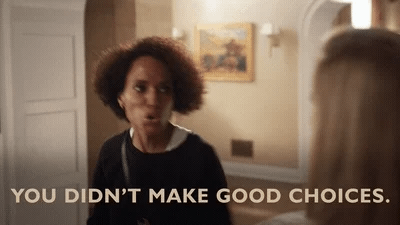Have you tried not being poor?
“Get your f*cking a*s up and work. It seems like nobody wants to work these days." - Just a few words of wisdom from Kim Kardashian. I'm guessing the class on social determinants of health was missed.
Before getting into the newsletter, this is another reminder that on Tuesday, August 13th, I am having a book launch! Yes, “Live Nourished” will officially be on the shelves on that date, and I am going to have an official launch celebration hosted by Cafe con Libros and a fun talk with my good friend and fellow author and Substacker, Chrissy King! Please click this link for all the details here for tickets and location. I would love to see all of you IRL (in real life.)
Okay, now on to today’s newsletter!
“Most healthy people don’t make excuses.” “It’s actually easy, but people don’t care.” These are the comments that are usually written underneath social media posts whenever nuance is brought up in the non-diet movement. Instant dismissal of any talk outside of nutrients and exercise is so common that I don’t even think twice when I see comments like these because it makes sense, given the society we live in. Don’t get me wrong, whenever I read comments like these, it garners a hard eye roll from me, but at the same time, it’s not surprising.
Does anyone remember the mini-drama series “Little Fires Everywhere?” I remember watching it on Hulu within a couple of days because it was so damn good. What I also remember was the mic drop line from Kerry Washington’s character Mia Warren, who is enraged at the entitlement of Reese Witherspoon’s character Elena Richardson and says very point blankly, “You didn't make good choices. You had good choices. Options that being rich, and white, and entitled gave you.” I mean, talk about a memorable moment on television. Epic.
Don’t worry, I won’t give away any spoilers (you should definitely watch if you haven’t), but needless to say, there was a distinct difference in circumstances and outcomes between these two characters. Yes it was a television show, and a very dramatized television show, but it still hit close to home because of certain situations. We are all dealt different hands in life, which is rarely acknowledged. We are products of our environments, and when we live in an individualistic society, it’s not a surprise that we (as a society) have individualistic thoughts.
Individualistic culture and mindset are common in Western society, and it can be described exactly as it sounds. It places the needs of the individual over the needs of the group as a whole. It screams, “Pull yourself up by your bootstraps,” and it rewards people for being independent and autonomous. This isn’t inherently a bad thing, as I think it’s important to think for oneself and know what’s best for you as an individual. When discussing nutrition, I often talk about doing what works best for an individual because we are not carbon copies of each other. Our bodies are, in fact, different, and we should view them as such. However, there is a stark difference between “eating this way works for me individually” and “I eat in the best way, and others who don’t are lazy.” An important piece of the puzzle missing for those who think like the latter is that not everyone can pull themselves up by their bootstraps because they don’t have access to boots.
In an individualistic culture, people are considered "good" if they are strong, self-reliant, assertive, and independent. But in order to be all of these things, we need to all start with the same equal resources and the same accesses, and unfortunately, we don’t. Equality assumes that everybody is the same and everybody needs the same thing, but some people will need more because they started with less, which is why we also need equity. Equity refers to the access or distribution of resources according to their need.
Social inequities in health are shaped by unfair distributions of the social determinants of health (SDOH), which are the conditions in the environments where people are born, live, learn, work, play, worship, and age that affect a wide range of health, functioning, and quality of life outcomes and risks. SDOH is a subject that I often discuss as a public health dietitian because I see it firsthand in the populations I work with. It’s fine to discuss equality, but I find that equity is often left out of the discussion. So, no, factors such as safe housing, transportation, education, job opportunities, access to food and physical activity opportunities, clean water, and literacy skills are not distributed evenly. All of these uneven distributions create barriers to reaching equality.

Whenever I discuss healthism, I’m almost always met with a comment from someone who thinks I just made up a word. This is especially comical because heathism is nothing new, and it was coined in 1980 by Robert Crawford, who described it as situating the problem of health and disease at the level of the individual. Solutions are formulated at that level as well. Think of how many articles we read telling people that their ailments will be cured if they do xyx. I think back to seeing quotes such as “No Excuses” or when the words discipline are used to describe making health a priority. These boil down to telling people they are in control of their own health and destiny, and the solution is to make better choices.
Crawford himself stated, “To the extent that healthism shapes popular beliefs, we will continue to have a non-political, and therefore, ultimately ineffective conception and strategy of health promotion. Further, by elevating health to a super value, a metaphor for all that is good in life, healthism reinforces the privatization of the struggle for generalized well-being.”
Healthism and individualism are the same thing. I want to be clear that there are, of course, behaviors we can partake in to better ourselves, but this would entail acknowledging that we all have the same resources. Not everyone will be afforded the same opportunity to get themselves healthy, and we should also stop weaponizing the word healthy altogether. Let’s look at some common characteristics of the individualistic culture:
Being dependent upon others is often considered shameful or embarrassing
Independence is highly valued
Individual rights take center stage
People often place a greater emphasis on standing out and being unique
People tend to be self-reliant
The rights of individuals tend to take a higher precedence
Obtaining free resources is very often looked down upon because it translates to asking for help when many believe we should “try harder.” Supplemental Nutrition Assistance Program (SNAP, formerly known as food stamps) is something that gets many who have an individualistic mindset agitated. Even though SNAP is a gateway for people to access nutritious foods, it is a free resource that is looked down upon. Even looking at the discussion of student debt, which is keeping many in poverty, you will often see folks saying that this debt shouldn’t be canceled because they themselves struggled to pay it off and managed, so others should be able to do the same.
So, what would be the opposite of individualism? Collectivist cultures emphasize the needs and goals of the group as a whole over the needs and desires of each individual. The relationships with other members of the group and the interconnectedness between people play a central role in each person's identity. As I previously mentioned, I don’t think that putting oneself first and doing what works best for us as individuals is inherently a bad thing. There are times when I think it’s best to think of ourselves, such as noticing when our physical or mental health is being affected. The conclusion that I want to drive home is that we cannot continue to talk about the health of society in an individualistic way. We cannot expect everyone to be able to “better themselves” as if everyone has the opportunity to do so.
Health is not a moral determinant, and it’s not 100% up to the individual due to many systemic barriers that prevent accessible and equitable healthcare, food options, housing, education, and more. Inequities are what cause inequalities, and inequities can stem from racism, sexism, classism, ableism, xenophobia, homophobia, and other forms of discrimination and bias. One of the good choices that I hope we, as a society, start making is the choice to recognize all of these systems and barriers in play. Health is individual. Health is subjective. Health is multi-layered. Health doesn’t equate to morality.
Just another reminder about the book launch for “Live Nourished” on August 13th. These are the details, and tickets can be purchased now.
And, of course, my book “Live Nourished: Make Peace with Food, Banish Body Shame, and Reclaim Joy” is available for preorder now.








I love this. As a disabled person I notice I see through a lot of snake oil promises my loved ones often don't regarding diets and food because I am very grounded in my reality that they are straight up impossible. I have a lifelong chronic illness so 'getting healthy' is impossible for me, for example. Health is not a meritocracy and I wish more people got that
I've never watched those shows and you have 100% vindicated my decision! Thank you :-)